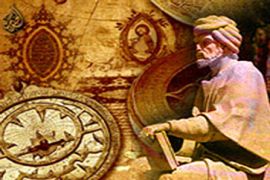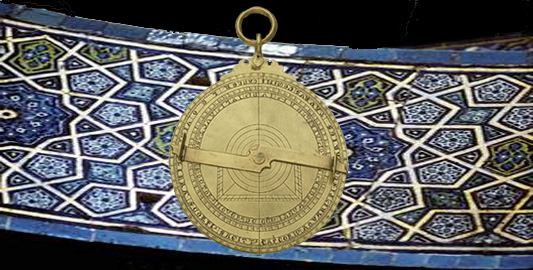Made by Muslims
Coffee, windmills, carpets, soap and the fountain pen were invented by Muslims.

 |
| Arab, science and innovation thrived between AD 650 and 1258 |
Muslims have invented everything from surgical instruments to the camera, according to an exhibition currently touring the Museum of Croydon in south London.
One inventor featured is Ibn Hazm, an Andalusian astronomer the exhibition credits with proving that the world was round 500 years before Galileo made his discovery.
The exhibition, 1001 Inventions: Discover the Muslim Heritage In Our World, which aims to uncover the lost history of Muslim science and invention, features some of the best-kept secrets and scientific contributions by ancient Muslim scholars.
Professor Salim Al-Hassani, chairman of the Foundation for Science, Technology and Civilisation (FSTC), which organised the exhibition, said: “The extent to which Muslims have contributed to Western civilisation is not generally well known. Yet these ancient scholars from the Islamic world gave us many of the everyday things we use such as coffee, soap and clocks.
“This exhibition shows that Muslims have always shared the heritage that provides a platform for developments that makes the Western world tick.”
Flowering civilisation
In the West, the Dark Ages are usually seen as an interlude between two great flowering civilisations, in which little advancement of knowledge took place.
|
“This exhibition shows that Muslims have always shared the heritage that provides a platform for developments that makes the Western World tick” Professor Salim Al-Hassani, chairman, FSTC |
However, in this period Islamic scholars across southern Europe, Africa, the Middle East, Persia and Central Asia were busy preserving and building on the knowledge of the ancient world.
For example, the exhibition organisers say that records show that the coffee bean was first used to make a drink when the bean was exported from Ethiopia to Yemen where Sufis drank it to stay awake at night to pray on special occasions.
Much of the Islamic world began to regard coffee as an aid for devotion, allowing dervishes to stay awake for long hours dedicating their nights to divine remembrance.
By the late 15th century it had arrived in Mecca, Saudi Arabia, then Turkey, and later Vienna in 1645.
Inventions
The exhibition credits the invention of the first pin-hole camera to Ibn al-Haitham, a 10th-century Muslim mathematician, astronomer and physicist.
It also says that Islam’s requirement for cleanliness and purity encouraged Arabs to develop the ancient Egyptians’ use of soap, and create the recipe combining vegetable oils with sodium hydroxide that we still use today.
A 10th-century Muslim surgeon, known only as al-Zahrawi, is said to have designed surgical instruments, which are still in use.
And Ibn al-Nafis, a 13th-century Muslim medic, is said to have described the circulation of the blood 300 years before William Harvey discovered it.
Muslims doctors are also credited with inventing anaesthetics of opium and alcohol mixes, and developing hollow needles to suck cataracts from eyes in a technique still used.
The windmill, often associated with the Dutch, is said to have been invented in 634 by mathematicians in the new Arab empire and used to grind corn and draw up water for irrigation.
Justin Champion, a professor of the history of early modern ideas, at the Royal Holloway, University of London, said: “The exhibition looks very impressive – exactly the sort of public history that ought to work to bring communities together.”
Missing history
Examining a thousand years of missing history, the exhibition brings to life historical inventions and innovations made by some of the greatest Muslim minds.
|
“Open any school book in Britain and you will find little, if any, mention of what Muslims have achieved historically” Mohammed El Gomati, |
Mohammed El Gomati, the director of FSTC, said: “The project started six years ago. The FSTC, a group made up of Muslims and non-Muslims alike, realised there was a need to travel around the country and educate and inform the public about Muslim contribution to the world.”
The exhibition is designed to encourage and inspire British youth to pursue careers in science, engineering and technology. It is hoped to help dispel negative perceptions of Muslims and provide positive role models to young British Muslims in particular.
El Gomati, a professor in physics and electronics at the University of York in England, said: “There is definitely an element of ignorance in the West towards the Arab Muslim world. Open any school book in Britain and you will find little, if any, mention of what Muslims have achieved historically.
“We have decided to redress this imbalance.”
The exhibition at the Manchester Museum of Science & Industry ends in June, other dates and venues are yet to be confirmed.